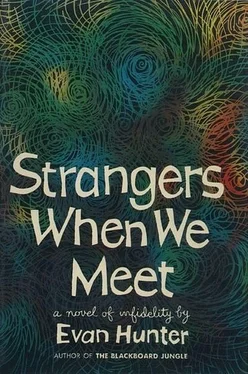“Really?” Felix asked. He smiled pleasantly. “Well, my life’s an open book, Don. I’m a butcher. I work in Manhattan. I live right here in Pinecrest Manor with the most wonderful woman in the world, and three adorable kids. I’m a happy man.” He paused. “Maybe I am a little quiet and introspective sometimes. Perhaps I think about things too much. But I’m sorry I give the impression of being difficult to know.”
“Well, maybe I was mistaken.”
“I guess a man like me becomes so involved with his own family that he forgets about his neighbors. I’m certainly sorry if I gave you the wrong impression.”
“No, no, forget it,” Don said. “Please, forget it.” He drew in on his cigarette. “How’s Betty?”
“Fine, thank you.”
“The kids?” Don asked, looking down at Brucie and tousling his hair.
“All in fine shape,” Felix said.
“Good, good.”
Both men were silent for a while. Don smoked his cigarette, and Felix hummed secretly with his silent knowledge. Don didn’t seem too anxious to get back to work.
“Where’s Margaret now?” Felix asked.
“Inside. Napping.” Don shrugged. “Lazy Sunday.”
“Sleeps a lot, does she?”
“Catches a nap every now and then. You know how women are.”
“Certainly.” Felix smiled. “Tired, is she?”
“Not tired, just... you know. A little sleepy, I guess. You know.”
“Sure.”
They stood silently for another few moments. At last Felix said, “Well, I guess I’ll be strolling along. Let you get back to digging up that grass.”
“I’ll see you,” Don said. He stepped on his cigarette and then pushed the point of his shovel into the earth.
“Shobel digger,” Brucie said.
“Yes,” Felix answered. “Shobel digger.” Turn the earth, Don, he thought as he walked away. Don’t let any grass grow under your feet. Your sweet wife sure as hell isn’t letting any grow under hers.
He almost burst out laughing.
God, it was good to be alive. God, it was wonderful!
“Do you know why she sleeps so much, Brucie?” he asked his son.
“S’eep?” Brucie said.
“Yes, seep. Do you know why?”
“Why?” Brucie asked, annoyed by the diaper, not having the faintest idea what his father was talking about, but humoring him anyway.
“Because when she sleeps, my son, she escapes. She flies to the arms of her lover. That’s why. Love. Be a lover, son. When you grow up, love them all.”
“Okay,” Brucie said, nodding, still not understanding a word his father was saying.
Felix Anders was ready.
He walked the streets of Pinecrest Manor, and he nodded politely to all the busy busy men, and he glanced only briefly at the sweet women in their sweet slacks and sweaters, so rounded, so sweet. He was ready.
When he saw the dark-haired girl, he didn’t recognize her at first. She was wearing tapered black slacks, and she was bent over digging into the earth at the front of the house, the black hair hanging girlishly over one eye. She looked very feminine and inexpert and Felix thought, How goddamned sweet women are.
She tossed her hair back then, lifting her head in a youthful, impatient movement, whipping the long black hair back over her shoulder. She was wearing a sweater, and her breasts were gently cradled by the wool, sweet, sweet.
“Oh, hi, Felix,” she said. “Taking a little stroll?”
He walked over to her, holding his son’s hand. “Out for my constitutional,” he said. “What are you doing, Eve?”
“Oh, trying to get something to grow,” Eve said. “I’ve never seen earth as stubborn as Pinecrest Manor’s, have you?”
“No,” Felix said. He kept watching Eve. There was a faintly bored smile on his mouth, a flicker of awakening intelligence in his green eyes. “You have to work it,” he said. He kept watching her. “If you work it, it’ll yield.”
Smiling, he watched her.
The sweat rolled down Don’s muscular arms, staining the handle of the shovel. He worked in old Army fatigue trousers and a khaki undershirt. The sun, so strong for March, beat down on his wide muscular back as he dug into the earth with his spade. There was an oppressively rich aroma to the freshly turned soil.
The memory did not come to him in an instant flash. He supposed later that the memory had been creeping up on him all the while he worked, and that the bird call had simply been the final triggering element to a long line of preceding elements — the Army costume, the hot sun, the smell of earth. He was using the spade with muscular force, pushing the point into the grass sod, shoving at it with the arch of his foot, digging deep, turning the shovel with a powerful wrist motion, getting under the sod and lifting it. He did not want to destroy good grass. He could use the sod to fill in patches on the front lawn. He could feel perspiration on his back and in his armpits and across his forehead, but it felt good to be out working with his hands. Foot by foot, he had measured out the proposed patio, indicated its boundaries with string, and then had begun digging. And all the while he dug, the memory of the island grew stronger and stronger, the rich fetid smell of the earth, the hot sun, the sweat; and then the bird call triggered it.
The leaves had been wet that day, despite the heat of the sun. It was impossible to move through the jungle without getting soaked to the skin. It was hard to breathe in the jungle. The air was dense and still, crowded with the exhalation of growing things, crowded in a tight, hot, timeless green prison. He moved through the jungle alone. He knew the rest of the men in his company were spread out in a wide arc working its way across the face of the island in a mopping-up operation. But if a man moved five feet away from you into the foliage, you could no longer see him. And so, though he knew he was part of a team, he felt alone.
He did not want to use his machete. If he ran across any Japs, he wanted his rifle in his hands where he could fire it instantly. He did not want to be caught swinging a machete by any goddamned Gook. He wanted to be ready. And so he moved cautiously, the machete speared through his belt to the right of the grenades. He wore no pack. He wore jungle issue gear and a netted helmet, and the sweat ran down the sides of his square face, trickled from his strong jaw onto his neck. The stock and barrel of the Browning automatic were moist with jungle sweat. He kept his finger inside the trigger guard, ready to fire. He did not want to be ambushed.
When he came upon the Jap, he was quite surprised.
He would have fired instantly if the Jap had burst from the jungle swinging a sword or leveling a rifle. But he had stumbled upon the enemy completely unaware; perhaps he should have fired the moment he saw him anyway, but he did not.
The Jap was an officer.
He knew that the moment he saw the Samurai sword in his belt and the insignia of his rank on the lapels of his blouse. He could not read the rank, but he knew that no enlisted Japanese soldier wore such insignia. The man was sitting against the trunk of a tree smoking. He carried no rifle. There was a pistol hanging in a holster on his belt. That, and the long Samurai sword. Nothing else.
He had not heard Don. He sat smoking leisurely under the tree, as if the island had not been exposed to bombing and shelling for the past four days, as if a Marine assault wave had not stormed the underwater barbed wire and the concrete pillboxes on the slopes facing the sea, as if the Army had not swarmed ashore and driven the enemy back across the island, as if the simplest mopping-up exercise were not now in operation.
He sat smoking casually. He might have been sitting on an outdoor terrace somewhere in Fukuoko, listening to a woman play a Japanese stringed instrument, watching the sun sink, watching the mountains of his homeland turn purple with dusk. He seemed completely unconcerned with the war, with the island, with the uniform he was wearing. For an instant suspended in time, Don had the strangest urge to walk to the man, sit down beside him, and share a smoke with him. And then the absurdity of the whim struck him. He felt the hackles at the back of his neck rising, felt his scalp begin to prickle beneath the netted helmet.
Читать дальше












